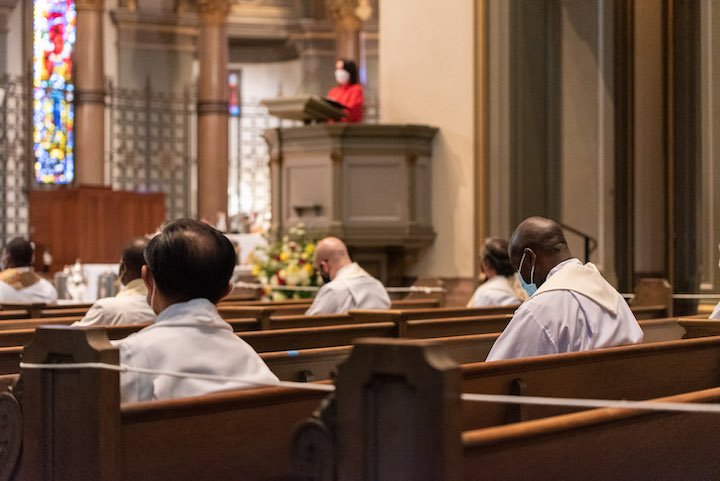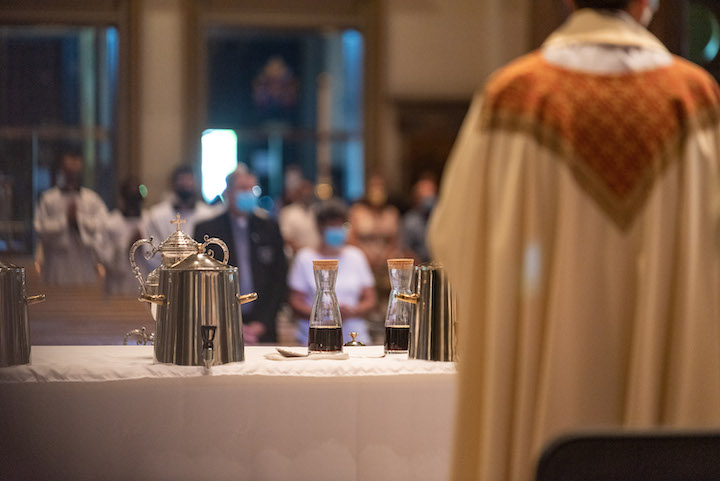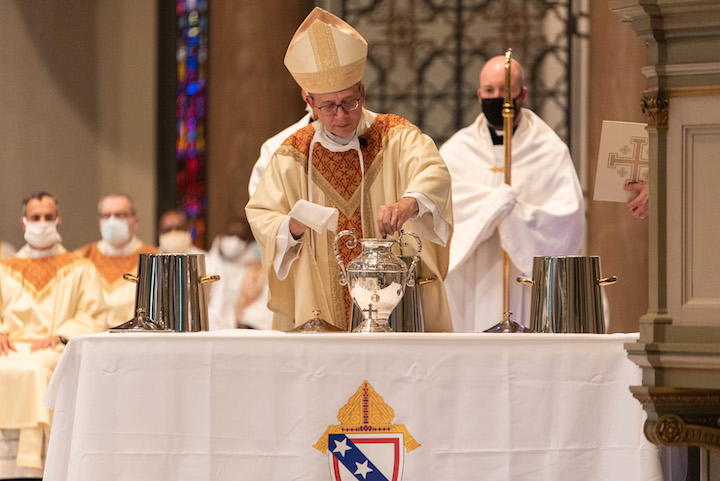Brian T. Olszewski, The Catholic Virginian
The Chrism Mass in the Diocese of Richmond was finally celebrated.
Scheduled for April 6, the Monday of Holy Week, but postponed due to state-imposed restrictions for church gatherings due to COVID-19, the Mass was celebrated by Bishop Barry C. Knestout on Friday night, July 10, at the Cathedral of the Sacred Heart, Richmond.
Like the year itself, it was not the usual Chrism Mass. Participants wore masks, social distancing determined seating, and the size of the congregation was limited by restrictions for church gatherings.
The congregation, which at previous Chrism Masses would draw several hundred worshipers, was composed of 60 priests, seven deacons, 46 members of the laity and 24 seminarians, according to the diocesan Office of Worship. The liturgy was livestreamed on the diocesan website.

(Photo/Michael Mickle)
What was the same was the ritual that dates to the early Church — a ritual in which the bishop blessed the oil of the sick and the oil of catechumens, and consecrated the sacred chrism.
In addition to the blessing and consecration of the oils, which were distributed to each parish, the Chrism Mass celebrated the ministry of priests serving in the diocese.
The bishop began his homily by noting the multiple dimensions of the Mass.
“This evening’s liturgy is not about any one person or any one priest,” he said. “It is about the whole presbyterate and the work of the whole Church in cooperation with the Holy Spirit.”
Referencing the evening’s Gospel, Luke 4:16-21, Bishop Knestout said that those to whom Jesus spoke in the temple were focused upon him.
“So, it is for us today – our eyes are not fixed on any of the noise or distractions that life regularly presents to us. Our eyes are fixed on Jesus and his presence in the sacraments,” the bishop said. “He is the messiah, the anointed one. He is the fullness, the fulfillment, of kingly, priestly and prophetic power and authority.”
Bishop Knestout explained the significance of the oils.
“The oils are used to bring enlightenment, strength, healing and encouragement to us, God’s people, as we live out the discipleship to which we are called,” he said, adding that the oils are used in the sacraments “which are a remedy for sin — sin (that) has damaged.”

(Photo/Michael Mickle)
Because of that damage, the bishop said, people may refuse to transform their lives.
“Oils overcome resistance. Oils are used to restore what is dry and broken and make them moist and supple, to transform that which is brittle and inflexible into something resilient and adaptable, something that is rough and unrefined into something that is smooth and finished, what is brutish and imperfect into something beautiful and pleasant,” said Bishop Knestout. “So too does the Holy Spirit overcome our resistance, our stubborn opposition to make us pliable, cooperative and receptive to the action of God.”
The bishop noted the role of the Holy Spirit in helping people get over their “stubborn pride and our own ideologies.”
“We need an anointing that brings enlightenment,” he said. “The anointing of the Holy Spirit transforms our will, our attitudes, making us ready and receptive to the influence of God – refocusing our attention, our minds and thoughts toward God’s word and his plan for us.”

(Photo/Michael Mickle)
That transformation of people’s actions, according to the bishop, directs them toward “the cardinal virtues, theological virtues and fruits of the Holy Spirit.”
“The anointing of the Holy Spirit gives us zeal and energy for the work we do in cooperating with God’s will,” he said. “Through anointing of the Holy Spirit, we receive courage and consolation to bring us hope and healing.”
Near the conclusion of his homily, Bishop Knestout spoke about the ministry of priests.
“We rejoice in God’s blessings and ask the power of the Holy Spirit to transform their lives and hearts in conformity with the life of Christ, so the Church and the world might be helped to be transformed according to the Gospel,” he said.
Following the homily, the priests stood and renewed the commitment of service they made when they were ordained.
